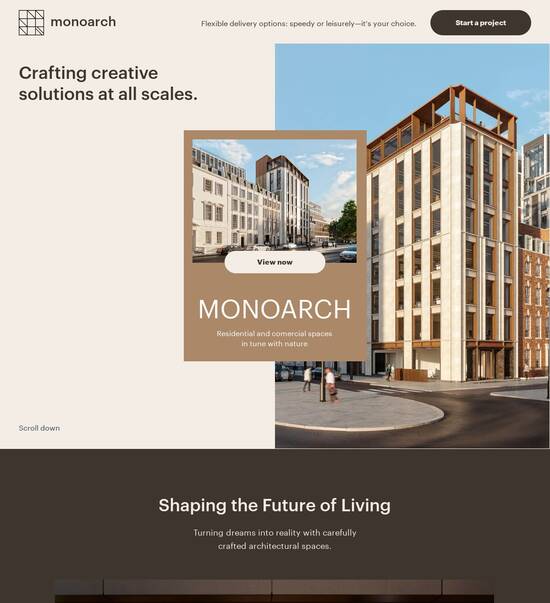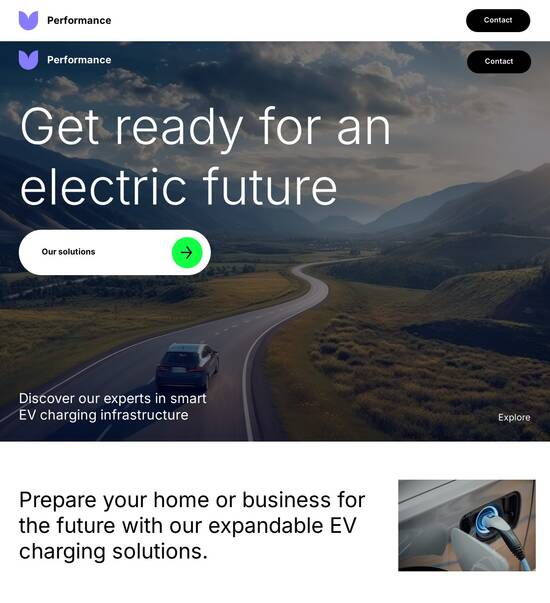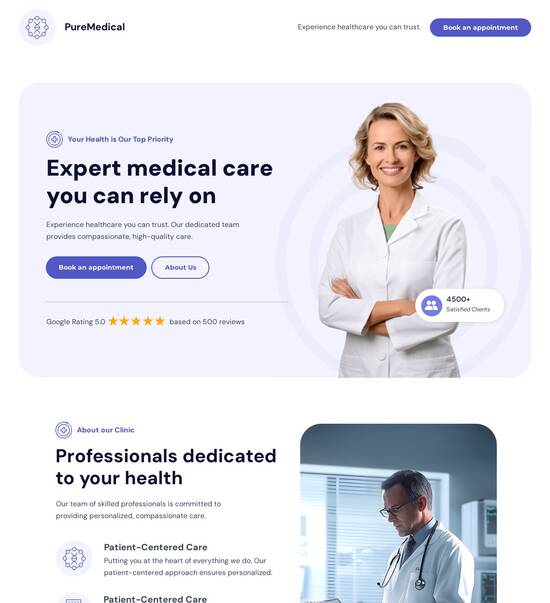
HTML page template for Help desk specialists
Use TemplateAbout template
Attract clients and showcase your skills with style using our landing page templates for Help desk specialists. Let's convert those visitors into clients!
Recommended templates

Easy to build without coding
With the intuitive drag-and-drop builder, anyone on your team can create high-converting pages without any knowledge of code or design. Make enhancements to your landing page with custom widgets using Javascript, HTML/CSS, or third-party scripts.

Multiple layouts for any industry and goal
Select from 500+ landing page layouts built to boost conversions across industry-specific scenarios. Customize them by adjusting fonts, adding images, and generating on-brand content with the AI assistant. Quickly scale with Instablocks® and Global Blocks that you can save, reuse, and update globally.

Loads fast and looks polished on any device
Every template is responsive, which means they present professionally on any device and load blazingly fast with our Thor Render Engine. You can also power them up with Google AMP technology to deliver an unparalleled mobile experience and drive higher conversions.

Robust analytics & experimentation
Get real-time updates and reporting across all your devices, showing the number of visitors, conversions, cost-per-visitor, and cost-per-lead. Launch AI-powered experiments, run A/B tests, and use heatmaps to analyze user behavior, then optimize your landing page to maximize conversions.







Easy to build without coding
With the intuitive drag-and-drop builder, anyone on your team can create high-converting pages without any knowledge of code or design. Make enhancements to your landing page with custom widgets using Javascript, HTML/CSS, or third-party scripts.
Multiple layouts for any industry and goal
Select from 500+ landing page layouts built to boost conversions across industry-specific scenarios. Customize them by adjusting fonts, adding images, and generating on-brand content with the AI assistant. Quickly scale with Instablocks® and Global Blocks that you can save, reuse, and update globally.
Loads fast and looks polished on any device
Every template is responsive, which means they present professionally on any device and load blazingly fast with our Thor Render Engine.
Robust analytics & experimentation
Get real-time updates and reporting across all your devices, showing the number of visitors, conversions, cost-per-visitor, and cost-per-lead. Launch AI-powered experiments, run A/B tests, and use heatmaps to analyze user behavior, then optimize your landing page to maximize conversions.
All the features you need to build lead-generating landing pages
Explore more featuresLearn how to build top-performing landing pages for any goal
FAQs
Leading the way in building high-performing landing pages





Creating high-converting landing pages with Instapage
Instapage empowers marketers to create effective landing pages effortlessly, designed to enhance conversion rates and optimize digital campaigns. With a powerful all-in-one platform, marketers can access over 100 templates, enabling quick deployment without the need for coding knowledge.
Understanding Instapage’s features
The platform combines essential tools ideal for marketers in various sectors, including business services, education, and financial services. Here are the standout features:
- Templates and Lead Generation Elements
- Access a diverse library of over 100 ready-to-use templates that are proven to convert. Each template includes built-in lead generation features, allowing for swift creation without a hefty time investment.
- Optimization Tools
- Incorporate experimentation features such as A/B testing to refine your landing pages. Use heatmaps for deeper insights into user behaviors, enabling data-driven decisions.
- Personalization Capabilities
- Dynamically tailor your content to suit specific audience segments through features like dynamic text replacement, improving user engagement and conversion rates.
Step-by-step guide to setting up your landing page
To create an impactful landing page with Instapage, follow these steps:
- Choose a template
- Select from one of the high-converting templates. Ensure it aligns with your campaign objectives.
- Utilize Instablocks
- Drag and drop various components from the Instablocks library to build your page. Customize elements to fit your branding.
- Implement optimization techniques
- Once your page is set up, conduct A/B tests to identify which variations lead to better performance. Make adjustments based on analytic insights.
Collaborating with your team on Instapage
Streamline collaboration within your marketing teams using Instapage’s features:
- Real-time feedback
- Allow team members to provide feedback directly on the page, facilitating a smoother review process.
- Secure sharing
- Easily share your landing pages with stakeholders to gather insights or approval swiftly.
- Editing and Revision
- Make edits live, ensuring everyone sees the latest version of the project without delays.
By leveraging Instapage, marketers can create, optimize, and enhance landing pages that drive significant outcomes for their campaigns. The collaborative features ensure that everyone involved can contribute, making the process quicker and more efficient.
Ready to boost your conversion rates? Start creating your landing page with Instapage today!
HTML page template for help desk specialists
Understanding the importance of HTML page templates for help desk specialists
Help desk specialists play a pivotal role in ensuring customer satisfaction and providing effective support. Their primary responsibilities revolve around assisting users with technical issues, guiding them through troubleshooting steps, and ensuring they receive timely solutions. The ability to communicate effectively is crucial, as these specialists often serve as the bridge between complex technical information and user comprehension.
A well-structured web presence can significantly impact how customers perceive and interact with support services. An HTML page template designed specifically for help desks can create a streamlined user experience that fosters trust and encourages engagement. When support resources are easily accessible and well-organized, it elevates the overall user experience and maximizes the potential for customer loyalty.
Key features of HTML page templates
HTML5 has revolutionized web design with its dynamic and responsive capabilities. With a focus on delivering content across various devices, HTML5 allows help desk pages to adapt to different screen sizes effortlessly. This responsiveness is critical as users often reach out for support using smartphones or tablets. A well-optimized help desk page ensures users can easily navigate the site, regardless of the device they are using.
Consider implementing various responsive design elements like flexible grid layouts, fluid images, and CSS media queries. For example, when a user accesses a help desk page on a mobile device, they should experience an interface that adjusts smoothly, maintaining usability. This flexibility lessens frustration and enhances user satisfaction.
Flexibility: Adaptable layouts for various screen sizes.
Fluid Images: Scalable graphics that retain quality on different displays.
Enhancing Navigation: Simplified menus for ease of use.
Pre-built landing page templates specifically tailored for help desks can showcase essential support information effectively. These templates address the unique needs of customer support, incorporating elements like FAQs, troubleshooting guides, and contact options directly into the user interface. Industry-specific templates can streamline operations by including features and functionalities relevant to certain sectors, such as IT or education.
When considering templates, it’s important to compare generic options with specialized designs. Generic templates may offer broad functionalities, but they often lack the specificity that a help desk requires to function effectively, such as ticket tracking systems or live chat functionalities.
Crafting engaging front page designs
In designing the front page of a help desk website, user-centric design principles should take precedence. A focus on intuitive navigation ensures that users can effortlessly find the support they need without feeling overwhelmed. Key design elements that enhance user engagement include the integration of prominent search functions that allow quick problem identification and resolution.
Additionally, clear call-to-action buttons are essential. Whether it's directing users to submit a support ticket or encouraging them to explore self-help resources, these buttons must be strategically placed and visually distinct to grab attention. Including visible login and registration forms allows for seamless user experience, enabling quicker access to support features.
Intuitive Navigation: Simple and logical layout making information easy to find.
Prominent Search Functions: Quick access to necessary support resources.
Clear Call-to-Action Buttons: Direct users to desirable actions promptly.
An impactful header sets the tone for the help desk page. Essential elements include brand/logo placement, relevant navigation links, and contact options that create a trustworthy atmosphere. Conversely, the footer should encompass contact information, social media links, and quick links to crucial sections like FAQs. This layout contributes to the overall usability and accessibility of the page, keeping valuable information readily accessible.
Exploring website templates and themes
Customizable templates specifically designed for help desks can significantly improve user experience. These themes offer flexibility in branding while allowing help desk operations to maintain a consistent look and feel. Different templates can cater to various industries such as business services, education, and technology, each having unique requirements. For instance, a financial services help desk might prioritize security features, whereas an educational platform will require intuitive knowledge-sharing capabilities.
Making modifications to templates can lead to significant improvements. Adjustments can include altering the color scheme to reflect brand identity, changing layout arrangements for better information flow, and integrating relevant images or icons to enhance visual hierarchy. This level of customization can empower help desks to resonate uniquely with their audiences.
A blog section integrated within the help desk site is valuable for ongoing user engagement. Regular blog content can provide users with tips and tricks that enhance their understanding of products and services, keeping them informed about updates and features. Moreover, including user-generated content and testimonials can foster a community atmosphere and validate the services offered.
Integration of Blog Sections: Keeps users informed and engaged with updated content.
User-Generated Content: Enhances community feeling and trust.
Relevant Tips and Tricks: Improve user competency with products or services.
Enhancing functionality through forms
Designing effective forms is integral for facilitating interaction between users and help desks. Key types of forms include contact forms, feedback forms, and ticket submission systems. Each form must be user-friendly, with minimal fields that require concise and clear instructions to prevent overwhelming users. Additionally, validating input can enhance user experiences by offering real-time feedback during form submission.
Beyond front-end design, backend functionality is crucial. Help desk templates should integrate with backend systems that support effective operations, such as Customer Relationship Management (CRM) tools, email marketing platforms, and chatbots. This integration can automate ticketing processes, track interactions, and streamline user communication efforts.
Elevating user reach and engagement
Implementing SEO best practices on help desk pages is critical for attracting users seeking assistance. Keywords relevant to the services provided, as well as common queries, should be strategically integrated into the content. Crafting compelling meta descriptions and title tags can enhance visibility and click-through rates on search engines, thus opening more avenues for user engagement.
Analyzing user interaction and website performance is vital for continued success. Metrics such as page views, bounce rate, and conversion rates should be monitored regularly to gain insights into user behavior. Tools like Google Analytics can uncover valuable data that assists help desk teams in understanding user needs and making informed improvements to the website.
Best practices for web design in help desks
Maintaining consistency in design elements across help desk pages is crucial. This cohesion helps reinforce brand identity and assists users in navigating the site without confusion. Consistent fonts, color schemes, and imagery enhance brand recognition and create a seamless experience for users as they transition between different sections of the site.
Accessibility is another vital aspect of web design. Ensuring compliance with WCAG (Web Content Accessibility Guidelines) standards is key to making pages usable for individuals with disabilities. Features such as adjustable font sizes, descriptive link texts, and alt tags for images can accommodate a wider audience, promoting inclusivity on the help desk platform.
Future trends in help desk web design
Emerging technologies such as AI and machine learning are beginning to shape the landscape of help desk web design. These innovations allow for personalized experiences based on user behavior analysis and real-time adaptations of support resources. Anticipated features may include enhanced chatbots that can navigate complex queries or predictive systems that identify user needs before they arise.
Incorporating user feedback into template evolution is paramount. Encouraging customers to provide input on their experiences fosters a culture of continuous improvement. Analyzing this feedback can lead to actionable insights, illustrating what works and what might require adjustment, resulting in a more effective help desk presence.
Final thoughts on crafting exceptional help desk page templates
Selecting the right HTML template can yield long-term benefits for help desks. From enhancing user experience with responsive design to creating personalized content, an effective template aligns with user needs and support objectives. It serves as the foundation for trust-building with customers and offers a streamlined approach to assistance, ultimately fostering stronger client relationships.
Investing in an optimal help desk web design not only meets current demands but also prepares for future shifts in user expectations and technological advancements. The focus on user-centric features ensures that help desk specialists can continue providing excellent service and support, fulfilling their role effectively.
Ready to skyrocket conversions?
Supercharge your ad campaigns with high-performing landing pages
Get started














